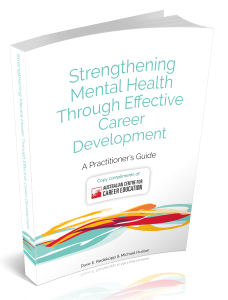
Top 10: Advancing career development in Canada
January 31, 2023
Building upskilling pathways for the future
January 31, 2023Being intentional about how your work influences client mental health supports positive outcomes
Michael Huston and Dave Redekopp

We’ve presented at conferences in Canada and abroad; participated in a study on career development and mental health in schools; worked with the Canadian Career Development Foundation (CCDF) on the MHO-5, a simple measure of changes in mental health outcomes; and partnered on an initiative to create a practical toolkit to guide well-being discussions within employment and career services.

The buck starts here. It is up to you to sustain interest in revealing and communicating the mental health outcomes accrued from career development services. Please do not wait for government, educational institutions or charitable organizations to lead the charge. You and those you serve are the first-hand witnesses to well-being improvements and will benefit most from stakeholders appreciating your role in these broader outcomes.
More on mental health and career development from CareerWise
Career interventions are mental health interventions. Here’s why
Book review: Strengthening Mental Health Through Career Effective Development
How career development is also a mental health practice
CDPs are a conduit. Despite marked improvement in societal understanding of mental illness and mental health, there is still considerable stigma about seeking help. Mental health concerns occur for one in five Canadians in any given year, and by age 40, half have experienced a mental illness (Smetanin et al., 2015).
In addition to the mental health-bolstering impact of our work, CDPs are a likely conduit to mental health supports. Unemployed people experience significant stress and related mental health concerns, but they are more likely to meet with a career practitioner than a mental health specialist for a few reasons: needs for food and shelter take precedent over well-being, waiting times for mental health services are daunting and stigma remains real. Our impact is amplified when we:
- Understand and can teach our clients how mental health and career development are related
- Are connected and can refer to a network of mental health professionals

iStock
Measuring matters. Career development work is usually measured and seen as successful when there is a clear career-related outcome (e.g. a client starts a new job or educational program). Improvements in client mental health appear early in interventions and it serves us to measure and communicate the difference we make.
Although most of us don’t see measurement as central to our roles, improvements in “hope” or “meaning” (definitional mental health outcomes) are obvious to clients and can be quickly measured by verbal report or short questionnaire. Our work on the MHO-5, mentioned above, suggests measuring is easy to do, clients find it relevant, and it augments and supports career development intervention.
Sharing measurement matters. We ask you to communicate the impact of career development on mental health in ways that will resonate with your colleagues, clients, administrators, funders and neighbours. You have always known your work supports mental health; the people around you likely do not.
Start with the people you trust the most. Let them know the mental health changes you have seen and measured. Listen to their responses and find out if they are really hearing you. Refine your approach until you know your message is being heard. Expand your efforts to broader audiences. Then, repeat! It is not difficult to include mental health in almost every discussion about career development. We invite and encourage you to do so.
Trauma is a mental health concern. Traumatic injuries can impair access, entry, engagement and ultimately the outcomes of career development intervention. Working within boundaries of competence – career professionals are not mental health or trauma experts – CDPs benefit from having some knowledge of trauma and its impact. They can then use their skills to create safety, navigate disclosure, and link clients to mental health services and resources.
You know your work is a valuable contributor to mental health. We invite you to intentionally strengthen, measure, and communicate this contribution. Doing so will, at minimum, raise your spirits, help your clients and improve your practice. Doing so may also create an ongoing and public conversation about the value of career development services.
Michael Huston is a counsellor and focuses on career development with specific interest in counsellor training, career intervention strategies and outcomes, career development as mental health intervention, and work and well-being.
In 35 years of working in the career development field, Dave Redekopp has been privileged to teach, develop and deliver programs, develop products, research and consult in almost all aspects of career development.
References
Smetanin, P., Briante, C., Khan, M., Stiff, D., & Ahmad, S. (2015). The life and economic impact of major mental illnesses in Canada: 2011-2041. Prepared for the Mental Health Commission of Canada. Toronto: RiskAnalytica.

